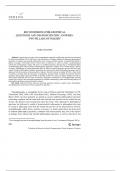HUMAN AFFAIRS 23, 606–615, 2013
DOI: 10.2478/s13374-013-0152-2
RECONSIDERING PHILOSOPHICAL
QUESTIONS AND NEUROSCIENTIFIC ANSWERS:
TWO PILLARS OF INQUIRY
MARK TSCHAEPE
Abstract: I propose the next steps in the neuropragmatic approach to philosophy that has been advocated
by Solymosi and Shook (2013). My focus is the initial process of inquiry implicit in addressing philosophical
questions of cognition and mind by utilizing the tools of neuroscientific research. I combine John Dewey’s
pattern of inquiry with Charles Peirce’s three forms of inference in order to outline a methodological
schema for neuropragmatic inquiry. My goal is to establish ignorance and guessing as well-defined pillars
of methodology upon which to build a neuropragmatic approach to inquiry. First, I outline Dewey’s pattern
of inquiry, highlighting the initial problematic phase in which recognized ignorance provides the basis upon
which to frame a philosophical problem and initiate the trajectory by which philosophical questions may be
addressed with the assistance of neuroscientific evidence. Second, I provide an outline of Peirce’s three forms
of inference, focusing upon the first phase of abduction: guessing. Third, I explain the transition between
ignorance and guessing, urging the benefit of attending to these two aspects of inquiry. Finally, I provide an
initial sketch indicating the next steps concerning a pragmatic reconstruction of neurophilosophy, pointing
towards the need for a more thorough examination of scientific methodology within and following analyses of
philosophical problems and neuroscientific evidence.
Key words: abduction; Dewey; discovery; guessing; ignorance; inference; inquiry; logic; methodology;
neuropragmatism; neuroscience; Peirce; pragmatism; questions.
Neurophilosophy, as exemplified by the work of Patricia and Paul Churchland (cf. P.S.
Churchland 2002; 1986; P.M. Churchland 2012), Michael Gazzaniga (1992), and Sam
Harris (2011), has been primarily an attempt to answer traditional philosophical questions
concerning cognition and the mind with facts derived from research on the central nervous
system, the greatest focus having been upon the brain.1 This approach to philosophical
questions has delivered a wealth of neuroscientific information to philosophers that may
be useful in addressing issues that fall outside the purview of the neurosciences; however,
neurophilosophy suffers from a problem of primacy, in which central focus has been given
to textbook philosophical questions, combined with neuroscientific data, but at the expense
of perhaps more relevant and tractable philosophical questions, as well as data that is not
1
For a thorough criticism of neurophilosophy from this point of view, I recommend (Solymosi 2011a).
606
© Institute for Research in Social Communication, Slovak Academy of Sciences
, solely neuroscientific (or is not merely brain-centric). This problem of primacy leads,
at least on the surface, to a seeming reductionism that does not clearly provide solutions
to philosophical questions. Rather, neurophilosophy often merely covers those questions
with neuroscientific data without sufficient argument connecting the questions with the
proposed answers. For some, the philosophy of neuroscience must be altered dramatically
in its approach to philosophical questions if it is to provide viable answers to philosophical
problems concerning cognition and mind.
The recent work of Tibor Solymosi and John Shook provides a Grundreinigung—a
clearing of the ground—for the philosophy of neuroscience, which advocates a synthesis
of pragmatic principles and neuroscientific inquiries as a reconstructive response to
neurophilosophy (Solymosi 2011a; 2011b; Solymosi and Shook 2013; Solymosi and Shook
[forthcoming]). Thus far, their work has primarily focused on the central tenets of what
they have entitled “neuropragmatism” that entails a stark separation from neopragmatism,
and neurophilosophy. Their approach to philosophical questions in light of neuroscientific
discovery draws heavily upon the work of the Classical American pragmatists, especially
the evolutionary philosophy of John Dewey, which they have rightly labeled as a precursor
to the general philosophical move toward the sciences in the latter half of the 20th century.
According to Solymosi, “Neurophilosophical pragmatism emphasizes Dewey’s method of
intelligence as the means for reconstructing our lived experience in light of the advances of
neuroscience” (2011b, 154). From this critical vantage point, neurophilosophy as it currently
stands has neglected its evaluative role that has been sustained by neopragmatism, while
neopragmatism has neglected important movements within the sciences that neurophilosophy
has pursued in addressing and advancing philosophical questions (2011b). Solymosi and
Shook call for a re-evaluation of philosophical questions concerning the mind and cognition,
which considers neuroscientific research while affirming the evaluative role implicit to
philosophical inquiry.
In the following, I propose the next steps in this neuropragmatic approach to philosophy.
My focus is the evaluative methodology implicit in addressing philosophical questions by
utilizing the sciences as a foundation for inquiry. Specifically, I proffer combining John
Dewey’s pattern of inquiry with Charles Peirce’s three forms of inference in order to outline
a methodological schema for neuropragmatic inquiry. This combination is necessary because
Dewey’s schematic pattern of scientific inquiry is thorough, but lacks a sufficient analysis
of hypothesis-generation, which is a fundamental part of the inferential process. In a similar
regard, Peirce’s three forms of inference are exhaustive qua forms of inference, but they do
not adequately account for the framing of problems that lead into the initial moments of
hypothesis-generation. Here my goal is a modest one: to establish ignorance and guessing
as well-defined pillars of methodology upon which to build a neuropragmatic approach
to inquiry. To do this, I first outline Dewey’s pattern of inquiry and highlight the initial
problematic phase of inquiry in which recognized ignorance provides the basis upon which to
frame a philosophical problem and initiates the trajectory by which philosophical questions
may be addressed with the assistance of neuroscientific evidence. Second, I provide an
outline of Peirce’s three forms of inference, focusing upon the first phase of abduction:
guessing. Third, I explain the transition between ignorance and guessing, urging the benefit
of attending to these two aspects of inquiry. Finally, I provide an initial sketch indicating
607




